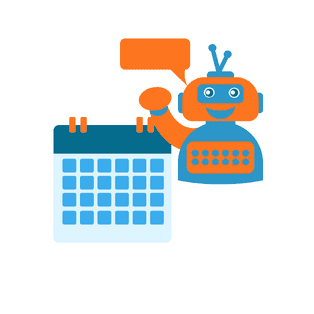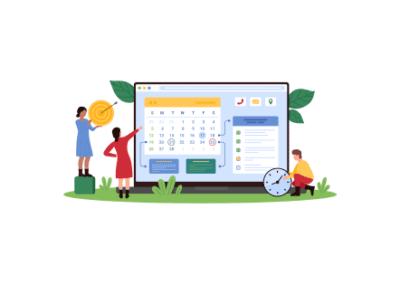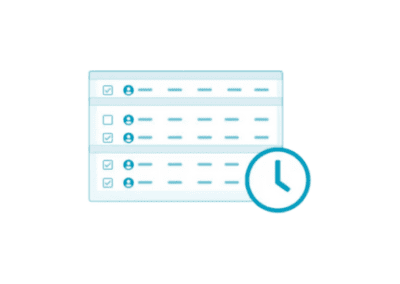Artificial Intelligence (AI) has become an increasingly important technology in many industries. The field of human resources (HR) is no exception. AI in human resources can automate repetitive tasks, optimize processes, and improve decision-making, so professionals become more productive, efficient, and effective. In this blog post, we’ll take a closer look at how AI is being used in HR and what benefits it can bring to the industry.
Most HR practitioners are open to the idea of AI into their HR processes. In fact, 64% of them reported in the 2019 study by Oracle and Future Workplace they would trust a robot over their manager for advice. Now, we’re not suggesting that AI can replace HR professionals. However, we do believe that AI can absolutely enhance HR operations to benefit your organization. Let’s look at how!
How to Leverage AI in Human Resources

Automating Repetitive Tasks
One of the biggest benefits of AI in human resources is that it can automate many of the time-consuming and repetitive tasks that HR professionals have to perform on a daily basis. For example, AI-powered recruitment tools can be used to screen resumes, schedule interviews, and even provide feedback to candidates. This saves HR professionals a significant amount of time. It allows them to focus on more important tasks, such as building relationships with candidates and hiring managers.
Optimizing HR Processes
Another us of AI in human resources is by optimizing processes. For example, AI can be used to analyze data on employee performance, engagement, and turnover. This can be used to identify trends and make predictions about future behavior. This information can then be used to make informed decisions about things like performance management, employee development, and retention strategies.
One specific application of AI in this area is performance evaluation. AI can analyze multiple performance indicators to provide an accurate assessment of an employee’s strengths and weaknesses. This helps managers to make more informed decisions about promotions, bonuses, and other rewards. Additionally, by automating the process, AI can reduce the risk of human error and bias in the evaluation process.
Improving Decision-Making
Another key benefit of AI in human resources is that it can help professionals make better decisions. For example, AI can be used to analyze data on candidates to predict which ones are likely to be the best fit for a particular role. This can help organizations avoid making poor hiring decisions and reduce the time and cost associated with onboarding new employees. HR Software like SenseHR gives users access to AI insights and assistance in order to make decisions based on real-life data.
Another area where AI can help with decision-making is in succession planning. So, not only can you find the right candidate for a role right now. With AI, you can also use it to assess how someone might fit into a role in the future! This information can be used to develop growth plans and prepare employees for future leadership roles.
Challenges and Limitations

While there are many benefits to using AI in human resources, there are also several challenges and limitations. It’s important that organizations are aware of these. One of the biggest challenges is ensuring that the AI systems used in HR are fair, unbiased, and transparent. This is especially important in areas like recruitment and performance evaluation. It’s important to remember AI can have a significant impact on employees’ careers. In this case, it’s best to use AI alongside human input.
Another challenge is ensuring that the data used by AI systems is accurate, complete, and up-to-date. If the data used by AI systems is biased, incomplete, or out-of-date, it can lead to poor decisions and outcomes. Organizations must therefore invest in data management systems that can accurately and efficiently collect, store, and process large amounts of data.
Finally, organizations must also be prepared for the potential impact that AI may have on the workforce. While AI can automate many tasks and improve decision-making, it may also lead to job losses or changes in job requirements. Organizations must therefore develop strategies for managing these impacts and ensuring that employees are prepared for the changes that AI may bring.
The Future of AI in Human Resources
AI has the potential to bring many benefits to the field of HR. However, organizations have to be aware of, understand and mitigate the risks it brings. By investing in the right tools and processes, and by working closely with employees to manage the impact of AI on the workforce, organizations can leverage AI to create a more efficient, effective, and productive HR function.
In addition to the benefits mentioned above, AI can also help organizations stay up-to-date with industry regulations and standards. It can improve the overall candidate experience, and provide insights into the skills and capabilities of the workforce. By leveraging these capabilities, organizations can create a more comprehensive and data-driven approach to HR, which can drive better outcomes for both employees and the organization as a whole.
In conclusion, the use of AI in human resources is not just a trend, it is becoming an increasingly important aspect of the field. As technology continues to evolve and improve, it is likely that we will see more organizations adopting AI and other advanced technologies in HR. By embracing these new tools and techniques, HR professionals can become more efficient and effective, and help their organizations to attract and retain the best talent, drive better business outcomes, and remain competitive in a rapidly changing business landscape.




